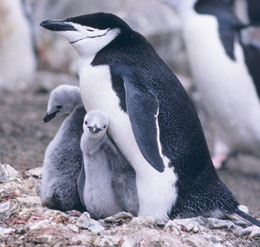Antarctic Peninsula warming affects penguins, krill
Antarctic Peninsula warming affects penguins, krill
mongabay.com
February 15, 2007
While much of Antarctica has cooled over the past decade, a warming trend in the Antarctic Peninsula may indicate what the future holds for the rest of the icy continent’s wildlife. Researchers at Ohio State University say that higher temperatures have already forced penguin populations to migrate south and may have reduced the availability of krill that serve as the based of the Antarctic food chain.
“We’re already seeing the marine ecosystems respond dramatically to increases in temperatures along the Antarctic Peninsula,” said Berry Lyons, professor in the School of Earth Sciences and director of the Byrd Polar Research Center at Ohio State University. “Researchers are seeing the movement of penguin populations southward down the peninsula as sea ice lessens along its margins,” Lyons said. “Gentoo and chinstrap penguins are shifting south into areas now populated by adelie penguins, and the adelies are being forced further south, all because of the change in sea ice.”

Chinstrap penguin and chicks at Seal Island. Photo by Lieutenant Philip Hall, NOAA Corps. |
Lyons said that Long-Term Ecological Research (LTER) site data suggest that a decrease in coastal sea ice will cause a drop in krill abundance.
“The data implies that there may be less food there as the temperatures rise,” he said.
Further changes in inland ecosystems could affect animal populations.
“It you look at the last 100 years or so, things have been warming in the valleys,” Lyons remarked. “We have seen lake levels rise, more melt from the surrounding glaciers and more aquatic ecosystems replacing soil-based ecosystems.”
Overall, warming in the Antarctic and a decrease in sea ice, as projected by many climate models, “will have great impacts on both the glacial dynamics of the continent but also on the fragile marine and terrestrial ecosystems that have been thriving there in the past.”
This article is based on a news release, “Antarctic warming to reduce animals at base of ecosystem, shift some penguin populations southward,” from Ohio State University.














